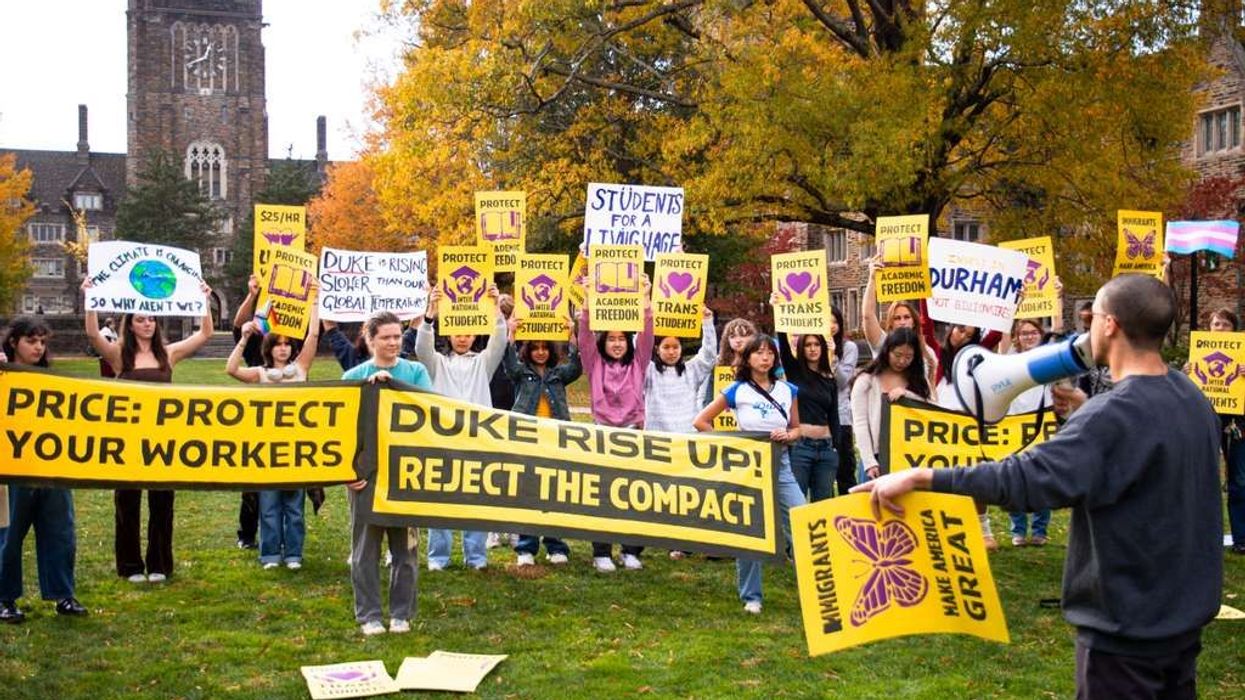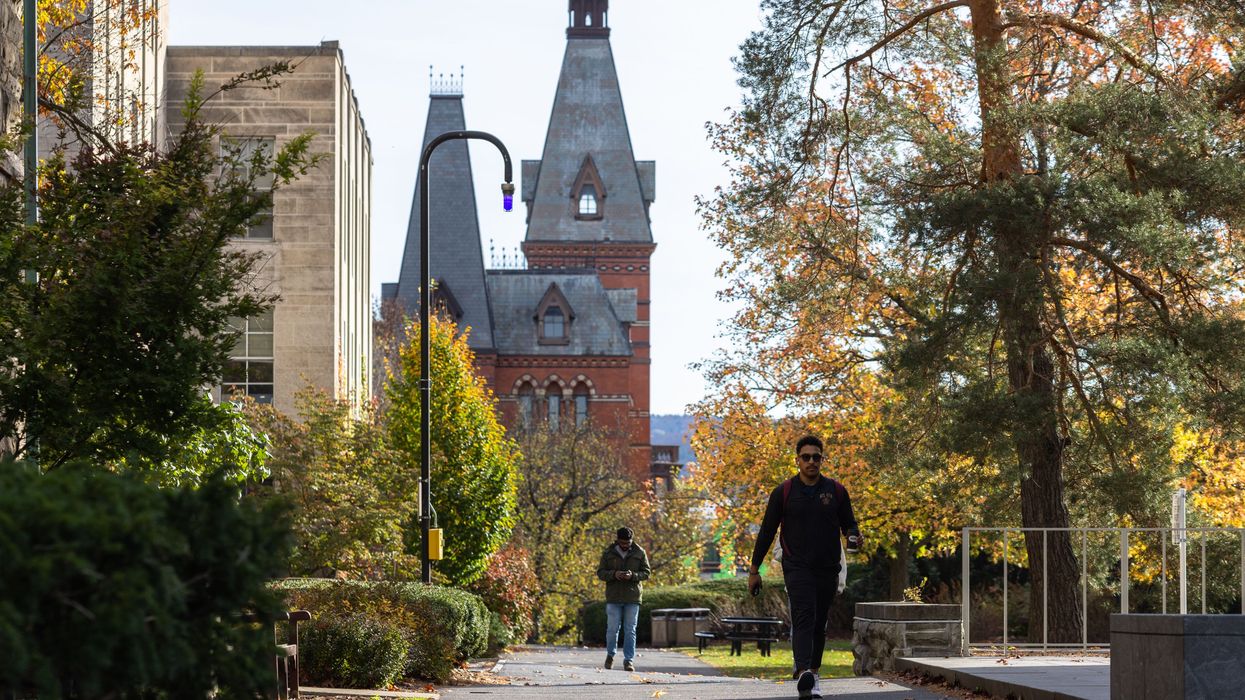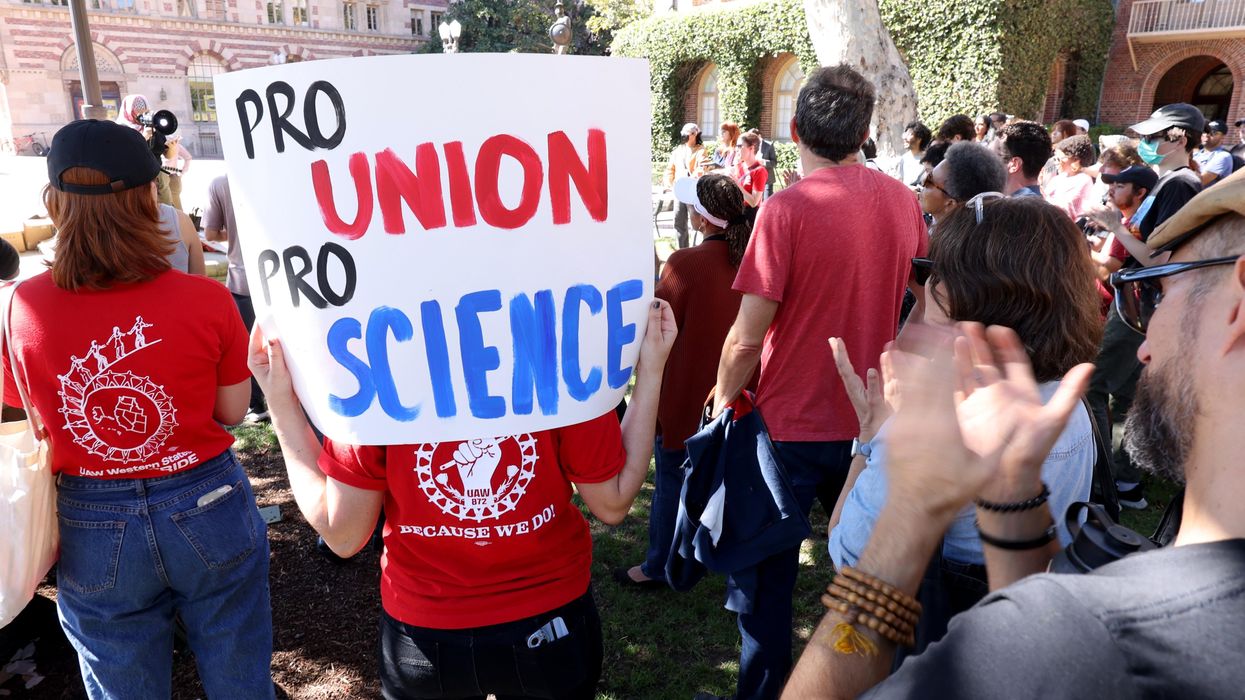Protesters at 100+ Campuses Tell Trump 'Hands Off Higher Ed!'
"We're not only out to defeat Trump, but to also win a vision for affordability, security, and freedom for our generation—both in higher education, and in our democracy," said one student organizer.
Students and professors at over 100 universities across the United States on Friday joined protests against President Donald Trump's sweeping assault on higher education, including a federal funding compact that critics call "extortion."
Crafted in part by billionaire financier Marc Rowan, Trump's Compact for Excellence in Higher Education was initially presented to a short list of prestigious schools but later offered to other institutions as a way to restore or gain priority access to federal funding.
The compact requires signatories to commit to "transforming or abolishing institutional units that purposefully punish, belittle, and even spark violence against conservative ideas," while also targeting trans student-athletes and diversity, equity, and inclusion (DEI) policies.
"The attacks on higher ed are attacks on truth, freedom, and our future. We're organizing to protect campuses as spaces for learning, not control—for liberation, not censorship," said Brianni Davillier, a student organizer with Public Citizen, which is among the advocacy groups and labor unions supporting the Students Rise Up movement behind Friday's demonstrations.
BREAKING: Students and faculty from across NYC have come together to tell Apollo CEO Marc Rowan that it’s going to be a lot harder than he thinks for billionaire greed to destroy higher education.
[image or embed]
— Sunrise Movement (@sunrisemvmt.bsky.social) November 7, 2025 at 11:43 AM
At the Community College of Philadelphia, protesters stressed that "higher education research saves lives." Duke University demonstrators carried signs that called for protecting academic freedom and transgender students. Roughly 10 miles away, at the University of North Carolina at Chapel Hill, they unfurled a banner that read, "Stand for Students | Reject Trump's Compact."
Professors from multiple schools came together for a rally at Central Connecticut State University, according to Connecticut Post.
"The compact would require universities submit to a system of government surveillance and policing meant to abolish departments that the government disapproves of, promote certain viewpoints over others, restrict the ability of university employees to express themselves on any major issue of the day," said James Bhandary-Alexander, a Yale Law School professor and member of the university's American Association of University Professors (AAUP) executive committee.
AAUP, also part of the coalition backing the protest movement, said on social media Friday: "Trump and Marc Rowan's loyalty oath compact is [trash]!! Out with billionaires and authoritarians in higher ed! Our universities belong to the students and higher ed workers!"
Protesters urged their school leaders to not only reject Trump's compact—which some universities have already publicly done—but also focus on other priorities of campus communities.
At the University of Kansas, provost Barbara Bichelmeyer confirmed last month to The University Daily Kansan that KU will not sign the compact. However, students still demonstrated on Friday.
"They did say 'no' but that's like the bare minimum," said Cameron Renne, a leader with the KU chapters of the Sunrise Movement and Young Democratic Socialists of America. "We're hoping to get the administration to hear us and at least try to cooperate with us on some of our demands."
According to The University Daily Kansan, "Renne said the groups are also pushing for divestment from fossil fuels, improvements in campus maintenance, and the removal of restrictions on gender ideology."
Some schools have declined to sign on to the compact but reached separate agreements with the Trump administration. As the Guardian reported Friday:
At Brown University in Rhode Island—one of the first institutions to reach a settlement with the Trump administration earlier this year—passersby were invited to endorse a banner listing a series of demands by dipping their hands in paint and leaving their print, while a group of faculty members nearby lectured about the history of autocracy.
"Trump came to our community thinking we could be bullied out of our freedom," said Simon Aron, a sophomore and co-president of Brown Rise Up. "He was wrong."
Brown isn't the only Ivy League school to strike a deal with Trump; so have Columbia University and the University of Pennsylvania, the alma mater of both Rowan and Trump. Cornell University followed suit on Friday amid nationwide demonstrations.
"November 7th is only the start," said Kaden Ouimet, another student organizer with Public Citizen. "We're building a movement of students, faculty, and campus workers to demand our colleges do not comply with the Trump regime, and its authoritarian campus compact."
"We know that to fully take on autocracy, we have to take on the material conditions that gave rise to it," the organizer added. "That is why we're not only out to defeat Trump, but to also win a vision for affordability, security, and freedom for our generation—both in higher education, and in our democracy."


